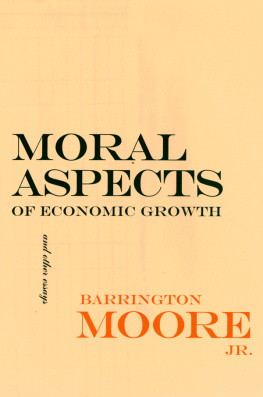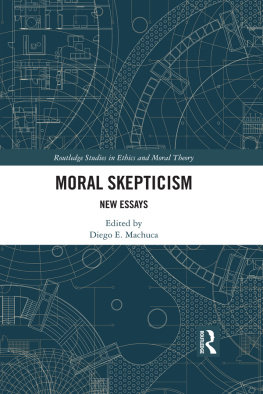Preface
All of these essays have to do with issues of authority, inequality, and justice, issues that have preoccupied me since my days as a graduate student at Yale University before the Second World War. All along I have made a strong effort to eschew lamentations in favor of explanations, though I do believe that a true explanation can make somebody lament. The opening essay, Moral Aspects of Economic Growth, represents the beginning of a large-scale comparative historical study that I had to abandon. The others are, I hope, reasonably self-contained and comprehensible as such. Austerity and Unintended Riches appeared in Comparative Studies in Society and History 29, no. 4 (October 1987), 787810; none of the other essays has been published before, though two have been given as public lectures. With one exception, Bequests of the Twentieth Century to the Twenty-first, which was written around the end of 1996, all the essays (including the two lectures) were written before 1992. The reader can judge how well, if at all, they have weathered the intervening years.
On the night after Valentines Day 1992 Elizabeth Carol Moore died. She had been home editor and much more to me for almost fifty years. This book carries no acknowledgments except to her.
B ARRINGTON M OORE , J R .
Cambridge, Massachusetts
Moral Aspects of Economic Growth: Historical Notes on Business Morality in England
This essay seeks to describe and account for the moral codes and patterns of behavior among the leaders in English commerce and industry during two widely separated periods of history. Though the emphasis is on the period of the industrial revolution (roughly from 1760 to 1860), in order to understand what was distinctive about that crucial epoch it is necessary to know the central features of commercial organization and practice in the preindustrial world. Hence the essay begins with some glances at the moral problems of medieval business from the early fourteenth to the seventeenth centuries.
I chose the medieval period partly because it was remote enough in time from the industrial revolution and could thus be expected to display some revealing contrasts and continuities. Another reason was the quality of the sources. The Selden Society has published a large quantity of primary source materials in the form of laws to control trade.1 They shed much light on the moral problems faced by men in trade during these early centuries. There is also a splendid monograph by Sylvia L. Thrupp, The Merchant Class of Medieval London [13001500], which provides detailed information on the economic, political, and social life of the merchants, their moral codes, and their actual behavior.2
Any moral code provides a description, justification, and explanation of how human society ought to work. Ordinarily a moral code by itself has little to say directly about how the society it purports to guide and instruct actually does work. Yet to the extent that it contains a description of evil behavior and its supposed causes, the code will shed valuable light on the actual behavior in that society.
The most important function of any moral code is to condemn and, if possible, prohibit certain specified forms of behavior. Such behavior may seem to be effective in the short run by yielding quick results, as in the case of a successful theft, or it may yield at least short-term pleasure, as in the case of an adulterous affair. From this standpoint violations of the moral code may seem to the individual to be shortcuts to desirable ends, but according to the moral code such shortcuts are judged to be harmful to the social order as a whole. In many human societies, though not in all, theft and adultery (the latter often considered a form of theft) are perceived and punished as anti-social acts.
The specification of certain kinds of behavior as anti-social has usually had a religious component and often a religious sanction. Ordinary people do not as a rule say that theft is evil because it is anti-social. They say that God or the gods forbid theft (usually a quite specific form of theft, such as stealing a horse) and will punish the thief in this life or the life to come or both.
The type of society one ought to strive for is defined to a great extent by the moral code adopted by the members of the society. This code also specifies the types of people and kinds of behavior the members of this society are expected either to love or to hate. In this way it defines the presumed threats to the social order.
In the record of human history, especially if we include the anthropological record, there can appear to be a bewildering variety of moral codes. It may be useful to outline briefly the huge historical transformation that forms the context of the moral changes and continuities to be discussed in this essay.
For centuries Europe had been under the rule of soldiers, with considerable assistance from the priesthood. The moral code of premodern Europe (and of many other parts of the world) was a military aristocratic one with strong religious overtones. Those who fought, or more accurately those who controlled the fighters, exercised what social control existed, which was very little indeed, until kings or rulers began to strengthen their power. Those who fought dealt with, and at times created, the main problems threatening this world. It was the task of the priesthood to take care of those in the next world. By various means the governing classes extracted a surplus of food and other products from the main economic producers: peasants and, somewhat later, artisans.
Under this system, and indeed in all premodern social systems, there was not much anyone could do to increase production and thereby raise the level of consumption. Cultivating land that had been left fallow was important but hardly led to changes comparable to those of the industrial revolution. Instead the main way for those with political clout to increase their share of the valuable goods of this world was through armed theft. One conquered some new territory and extracted tribute from it. This was essentially a zero-sum situation. Whatever the conqueror gained the conquered lost.
Thus in preindustrial societies the main ways to gain wealth were to take it away from someone else or to force someone elseslaves, serfs, or other forms of controlled laborto create wealth and turn it over to their masters. Even the Age of Discoveries, with its heavy emphasis on discovering new wealth, did not, so far as I can make out, produce any alternative to this rule of steal, oppress, or go without. Only with the industrial revolution did some men come to realize that it was possible to create wealth and new forms of wealth, such as machinery and coal mines, through their own collective efforts. The new way of creating wealth seemed less glamorous than the dashing military-aristocratic device of armed theft. Also a good many workers in the new mines and factories felt that budding industrial society merely introduced a new form of oppression barely masked by the wage contract. Hence, the coming of industrialism did not bring about universal rejoicing. Capitalists had a hard time promoting their virtues and those of the new era against the suspicions of both the older landed elites and many of their own workers.
Contrary to the hopes of some nineteenth-and even twentieth-century optimists, creating new wealth has by no means driven armed theft out of existence. Instead in the course of the twentieth century, the aristocratic element just about disappeared as armed theft became democratic and plebeian, especially in fascist movements and fascist regimes, though not only in these.













